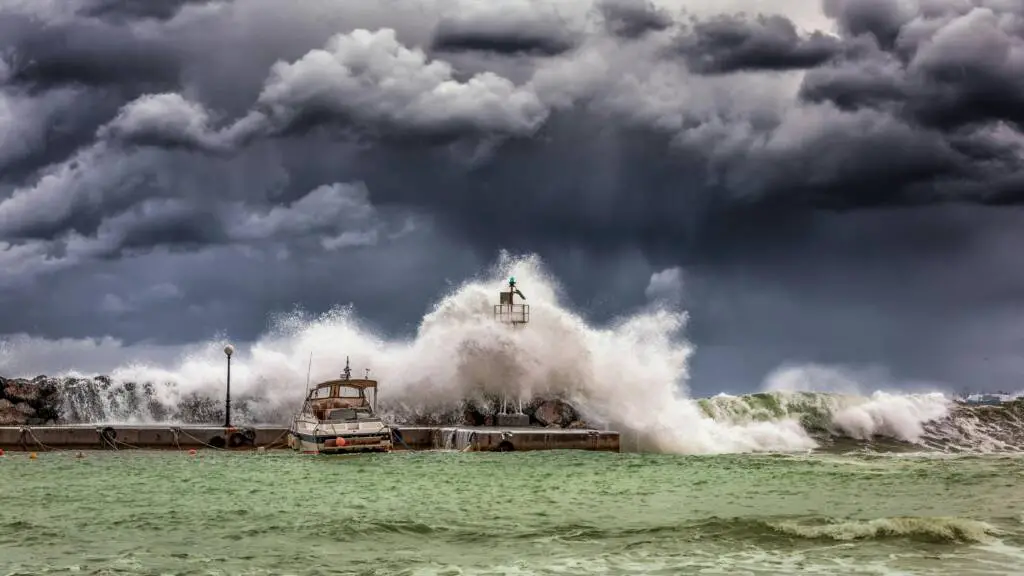Extreme Weather: Safety Tips

Extreme weather events can pose serious risks to individuals and communities, making it essential to be prepared and informed on how to stay safe. From tornadoes and hurricanes to heatwaves and blizzards, understanding the necessary safety measures and precautions can make a significant difference in protecting yourself and your loved ones during extreme weather conditions. In this blog post, we will discuss essential tips for staying safe in extreme weather, emergency preparedness measures, and key strategies for weather safety. Stay tuned to learn how to prepare for and navigate through various severe weather events.
Essential Safety Measures During Extreme Weather
1. Know the emergency evacuation routes in your area
Being aware of the designated evacuation routes in your area can help you quickly and safely navigate to a safe location during extreme weather events.
2. Stay informed about weather alerts and warnings
Stay tuned to local weather forecasts and warnings to be prepared for any impending extreme weather conditions. Consider investing in a weather radio for timely updates.
3. Stock up on essential supplies such as food, water, and medications
Ensure you have an ample supply of non-perishable food, water, and necessary medications to sustain you and your family during an emergency situation where access to supplies may be limited.
4. Have a communication plan with family members in case of separation
Establish a communication plan with your family members or loved ones in case you get separated during an extreme weather event. Determine a designated meeting point and maintain a list of emergency contacts.
5. Seek shelter in a sturdy building during extreme weather events
When extreme weather strikes, seek shelter in a sturdy building or a designated safe zone. Avoid staying outdoors or in vulnerable structures that may not withstand severe conditions.
Tips for Staying Safe in Extreme Weather Conditions
Avoid outdoor activities during extreme heat waves.
Stay hydrated to prevent heat-related illnesses.
Wear light-colored, loose-fitting clothing to stay cool.
Seek shade or air-conditioned places during heatwaves.
Check on vulnerable individuals such as the elderly or young children.
Emergency Preparedness for Severe Weather Events
When preparing for severe weather events, it is crucial to have a well-thought-out plan in place to ensure the safety of yourself and your loved ones.
Here are some essential steps to take:
Create an emergency evacuation plan for floods and storms
Identify safe areas and evacuation routes in your area. Make sure everyone in your household knows where to go in case of an emergency.
Gather important documents and store them in a waterproof container
Keep essential documents such as insurance papers, identification, and medical records in a secure and easily accessible place.
Prepare a well-stocked emergency kit with essentials like first aid supplies
Include non-perishable food, water, medications, a flashlight, batteries, a portable charger, and any other necessities to last at least 72 hours.
Keep important contact numbers handy for emergency services
Have a list of emergency contacts, including local authorities, hospitals, and utilities, readily available in case you need to reach out for help.
Practice evacuation drills with your family to be prepared
Regularly review and practice your emergency plan with all members of your household to ensure everyone knows what to do in the event of severe weather.
Weather Safety Tips for Extreme Conditions
-Stay indoors during thunderstorms to avoid lightning strikes.
-Secure outdoor furniture and objects that can become projectiles in high winds.
-Avoid driving through flooded roads during heavy rainfall.
-Turn off appliances and utilities during severe weather events to prevent electrical hazards.
-Monitor weather forecasts and alerts regularly.
Understanding Extreme Weather Awareness
Educate yourself about the different types of extreme weather and their risks. Recognize the warning signs of approaching severe weather conditions. Stay updated on local weather patterns and trends. Understand the importance of early preparedness for extreme weather events. Follow official recommendations and guidelines for weather safety.
Protecting Yourself from Extreme Weather Hazards
Extreme weather conditions can pose serious risks to your safety and well-being.
Here are some important tips to help you protect yourself from extreme weather hazards:
1. Take shelter in a safe place during tornadoes or hurricanes.
During tornadoes or hurricanes, it is crucial to seek shelter in a sturdy building to protect yourself from strong winds and flying debris. Designate a safe room in your home as a tornado shelter and stay away from windows during severe weather events.
2. Avoid outdoor activities during extreme cold or heat waves
Extreme cold or heat waves can be dangerous if proper precautions are not taken. Avoid outdoor activities during extreme weather conditions to prevent frostbite, hypothermia, or heat-related illnesses. Stay indoors and stay comfortable in a controlled environment.
3. Wear appropriate clothing and gear for different weather conditions
Dress in layers during cold weather and wear lightweight, breathable clothing during hot weather to regulate body temperature. Use protective gear like helmets or goggles during extreme weather events to reduce the risk of injuries.
4. Keep emergency supplies in your vehicle in case of being stranded during severe weather.
Prepare a roadside emergency kit with essentials like water, snacks, blankets, flashlights, and basic tools in case you get stranded during severe weather conditions. Keep a fully charged mobile phone and a portable charger for communication in case of emergencies.
5. Stay informed through weather radio or mobile alerts
Monitor weather forecasts and warnings through weather radio or mobile alerts to stay updated on changing weather conditions. Be prepared to take action based on official recommendations and guidelines to ensure your safety during extreme weather events.
Effective Ways to Prepare for Severe Weather Events at Home
Inspect and Reinforce Your Home
Regularly inspect your home for potential weather-related damages. Reinforce weak areas to withstand severe weather conditions.
Trim Trees and Branches
Trim trees and branches near your house to prevent damage during storms. Remove any dead or weak branches that could pose a risk.
Install Storm Shutters
Consider installing storm shutters or impact-resistant windows to protect your home against high winds and flying debris.
Secure Outdoor Items
Secure loose outdoor items or equipment that could become projectiles in strong winds. Store them in a safe place during severe weather events.
Backup Power Source
Have a backup power source, such as a generator, to keep essential appliances running during electricity outages caused by severe weather.
Ensuring Safety During Tornadoes or Hurricanes
When facing the threat of tornadoes or hurricanes, it is crucial to prioritize safety measures to protect yourself and your loved ones. Here are some essential tips to help you stay safe:
Designate a Safe Room
Designate a safe room in your home where you can take shelter during a tornado. This room should be on the lowest level of your house, away from windows, and preferably in a small, windowless interior room.
Stay Away from Windows
During tornadoes or hurricanes, stay away from windows as they can shatter and cause serious injuries. Seek the lowest floor of your house, such as a basement or storm cellar, to stay safe.
Follow Evacuation Orders
If local authorities issue evacuation orders for hurricanes, follow them promptly. Know the designated shelters in your area and seek refuge in those locations to ensure your safety during the storm.
Keep a Weather Radio Handy
Keep a battery-operated weather radio in your emergency kit to stay informed about tornado or hurricane warnings. This will provide you with essential updates and instructions to ensure your safety during severe weather events.
Practice Tornado Drills
Regularly practice tornado drills with your family to ensure everyone knows what to do in case of an emergency. This preparedness will help you act quickly and decisively when faced with the imminent danger of a tornado or hurricane.
Emergency Kit Essentials for Severe Weather Preparedness
When preparing for severe weather events, it is essential to have an emergency kit stocked with the necessary supplies to help you and your family stay safe.
Here are some essentials to include in your emergency kit:
Non-Perishable Food and Water: Pack at least a 72-hour supply of non-perishable food items such as canned goods, energy bars, and dried fruits. Make sure to include an adequate amount of water for hydration.
Flashlight, Batteries, and Portable Charger: Include a reliable flashlight with extra batteries in case of power outages. A portable charger for your communication devices can also come in handy to stay connected.
First Aid Supplies and Medications: Pack a basic first aid kit with bandages, antiseptic wipes, pain relievers, and any necessary medications for family members with chronic conditions.
Blankets and Warm Clothing: In case of cold weather conditions, have blankets, warm clothing, and emergency blankets to keep you and your family warm and comfortable.
Important Documents and Cash: Store copies of important documents such as identification papers, insurance policies, and emergency contacts in waterproof containers. It is also a good idea to have some cash on hand in case ATMs are unavailable during emergencies.
By having these essential items in your emergency kit, you can be better prepared to handle severe weather events and ensure the safety and well-being of your family.
Staying Safe During Heat Waves Without Air Conditioning
When facing extreme heat waves without air conditioning, it’s crucial to take proactive measures to stay cool and safe.
Here are some tips to help you beat the heat:
Stay Hydrated
Drink plenty of cool fluids throughout the day to prevent dehydration. Avoid alcoholic and caffeinated beverages as they can dehydrate your body.
Cool Your Body
Use fans to circulate air and take cool showers or baths to lower your body temperature. You can also apply a cold, damp cloth to your forehead and neck for quick relief.
Block Out Heat
Keep curtains, blinds, or shades closed during the hottest parts of the day to block out sunlight and reduce indoor temperatures. This can help maintain a cooler environment inside your home.
Find Cool Spaces
If your home becomes too hot, seek refuge in air-conditioned public places like shopping malls, libraries, or community centers. These spaces offer relief from the heat and can help prevent heat-related illnesses.
Check on Others
During heat waves, especially check on elderly neighbors or family members to ensure they are staying cool and hydrated. Offer assistance or support if needed to help them cope with the extreme temperatures.
Conclusion
Extreme weather events can pose significant risks to individuals and communities, but with proper preparation and awareness, you can stay safe and protect yourself during these situations. By following safety measures, staying informed, and having an emergency plan in place, you can minimize the impact of extreme weather on your life. Remember to always prioritize safety, seek shelter when needed, and proactively prepare for severe weather events. Stay vigilant, stay prepared, and stay safe.
https://7thavewellnessblog.com/?p=3739
https://www.weather.gov/
FAQs
Q: What is considered extreme weather?
A: Extreme weather refers to severe weather conditions that deviate from the average or usual weather patterns. This can include events such as hurricanes, heatwaves, droughts, and heavy rain.
Q: How can extreme weather be influenced by climate change?
A: Extreme weather events are increasingly linked to climate change due to the warming of the atmosphere. This can lead to more intense and frequent occurrences of extreme weather such as storms and heatwaves.
Q: What are some essential safety tips to follow during extreme weather conditions?
A: It is important to stay informed through weather forecasts, have an emergency kit prepared, have a communication plan in place, and follow evacuation orders when necessary to ensure safety during extreme weather events.
Q: How can human activities contribute to extreme weather events?
A: Human activities such as burning fossil fuels and deforestation can lead to an increase in greenhouse gas emissions, which in turn can contribute to climate change and the occurrence of extreme weather events.
Q: What are the potential impacts of climate change on extreme weather events?
A: Climate change can lead to more intense storms, prolonged droughts, increased wildfires, and other extreme weather events that may have damaging effects on ecosystems, communities, and economies.








